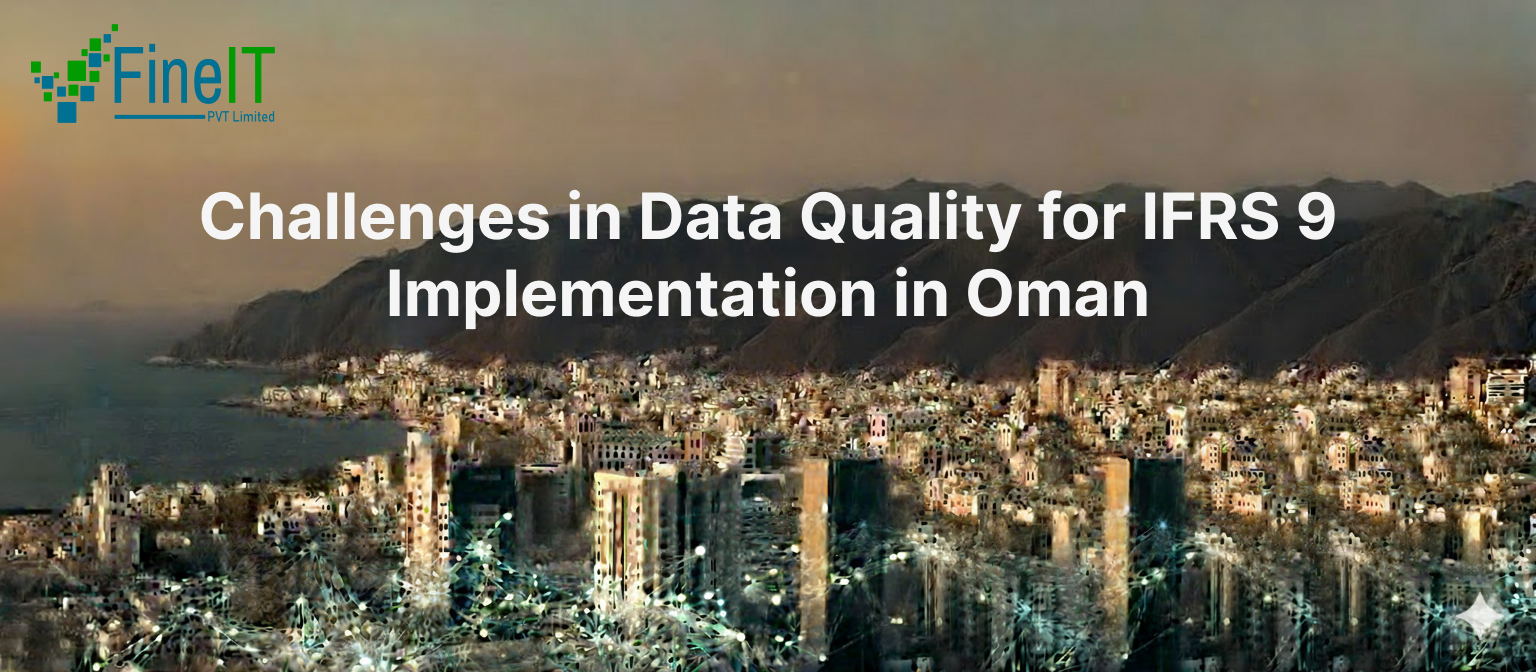The adoption of International Financial Reporting Standard 9 (IFRS 9) is a strategic move by Oman’s financial sector, mandated by the Central Bank of Oman (CBO), to align with global financial reporting standards. The core change is the shift from the backward-looking ‘incurred loss’ model to the forward-looking Expected Credit Loss (ECL) model. This new approach, however, makes data quality the single most critical and challenging factor in achieving accurate provisioning and regulatory compliance.
Key Data Quality Challenges
The complexity of the ECL model, which requires the estimation of losses over the lifetime of a financial instrument, places an enormous strain on the quality, volume, and structure of data within Omani financial institutions.
1. Insufficient Historical Data Granularity
The ECL calculation requires robust historical data to model parameters like the Probability of Default (PD), Loss Given Default (LGD), and Exposure at Default (EAD).
- Data Gaps: Many institutions, particularly smaller ones, lack the necessary deep historical records on defaults, credit rating migrations, and recovery data in the granular format (e.g., facility or contract level) required for statistical modeling.
- Data Transformation: Existing data from legacy systems often needs extensive and costly cleanup and transformation to be usable, as it was originally stored for the simpler IAS 39 ‘incurred loss’ methodology.
2. Difficulty in Integrating Macroeconomic Factors
The forward-looking nature of IFRS 9 dictates that ECL models must incorporate multiple macroeconomic scenarios and forecasts (e.g., GDP growth, oil price fluctuations, interest rates) relevant to the Omani economy.
- Forecasting Risk: Accurately predicting and integrating these specific economic variables into the models is highly complex and introduces significant model risk and subjectivity.
- Consistency: Ensuring a consistent set of macroeconomic data and assumptions is applied across all business units (Risk, Finance, Treasury) is a major data governance hurdle.
3. Legacy IT Infrastructure and System Integration
Many legacy core banking and risk management systems currently in use were not built to handle the volume, velocity, and complexity of data processing required by the ECL calculation.
- Disparate Systems: Data often resides in multiple, disconnected systems, making the aggregation into a single, reliable source for ECL computation a difficult and time-consuming process.
- Lack of Audit Trail: Older systems may not provide the necessary data lineage or comprehensive audit trails required to justify provisioning numbers to the CBO and external auditors.
4. Compliance and Validation Overhead
The CBO mandates rigorous validation and back-testing of ECL models to ensure their accuracy. Any data quality issue can lead to serious compliance failures.
- Subjectivity Risk: The principle-based nature of IFRS 9 allows for significant management judgment (e.g., in defining “significant increase in credit risk”), which must be meticulously documented and backed by high-quality, auditable data.
- Enhanced Reporting: The standard demands more detailed and frequent disclosures (IFRS 7), placing further pressure on data extraction and reporting capabilities.
Conclusion:
The implementation of IFRS 9 is a strategic necessity for Oman’s financial sector, elevating it to global standards of transparency and risk management. However, the path to compliance is fundamentally a data transformation project. Success hinges on resolving challenges related to historical data gaps, integrating complex macroeconomic forecasts, and modernizing legacy IT systems. Proactive investment in data quality, governance, and advanced analytics is essential for Omani financial institutions to achieve accurate provisioning and maintain regulatory trust.
At FineIT, we help financial institutions across Oman design, implement, and validate IFRS 9-compliant ECL models—from data governance and system integration to regulatory reporting and validation.
Let’s make compliance your competitive advantage.
Muzammal Rahim Khan is the CEO and Co-Founder of FineIT, bringing over 15 years of expertise in software development, implementation, and technical consulting across global markets including the U.S., U.K., Europe, Africa, and Asia. He has led the design and delivery of enterprise-grade solutions that modernize compliance, risk management, and financial reporting for banks and financial institutions. Under his leadership, FineIT has built flagship platforms such as Estimator9 (IFRS 9) and ContractHive (IFRS 16), empowering clients with automation, accuracy, and audit-ready confidence. Muzammal combines deep technical knowledge with strategic vision, driving innovation that bridges regulatory requirements with practical, scalable technology. His focus remains on building resilient, future-ready solutions that strengthen trust and efficiency in financial services.
